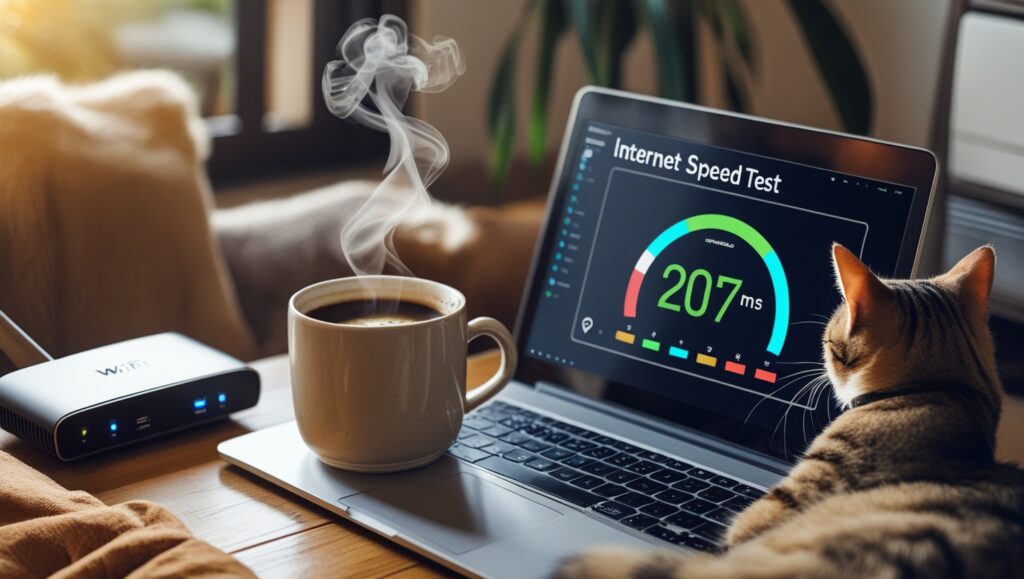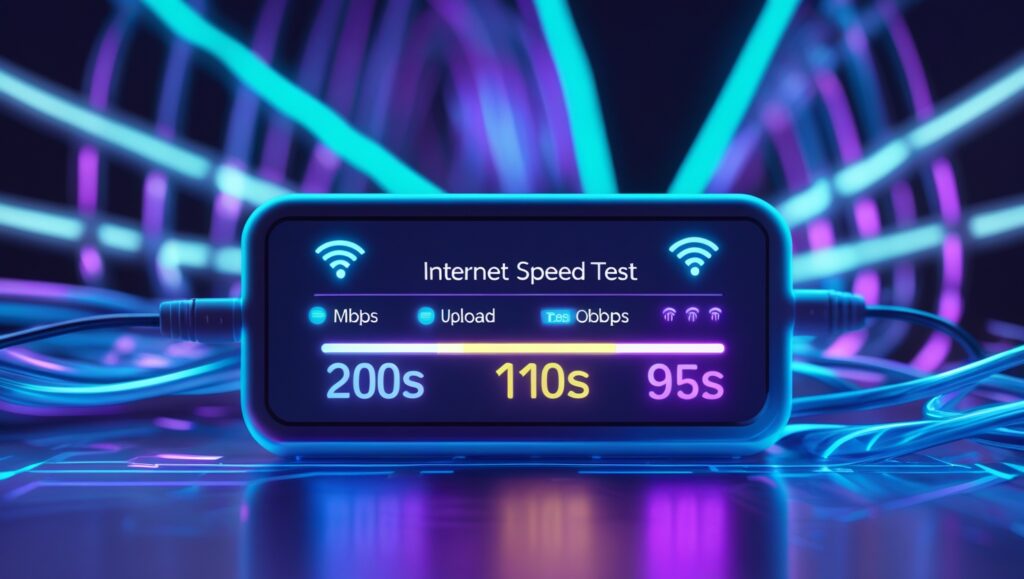We are authentic. There’s nothing humiliating like the movie. Popcorn is in your hand. Or you win a heated game match and suddenly freezes mid-shot. I was there and cursed it. This is where my friend “Internet Speed Tests” come up.
Now I’m not a network engineer (only someone who lives after cozy browsing and slow YouTube Bing), but after years of attempts, errors and writing my router, there’s one or two about internet speed. Drink coffee, drink cable modems, and soak in some amazing, crazy Internet Speed Test.
What Is an Internet Speed Test Anyway?
If you’ve never taken one, an internet speed test is a quick way to measure how fast your internet connection is. Think of it like a thermometer for your Wi-Fi—it tells you what kind of performance you’re really getting.
You’ll see terms like:
- Download speed (how fast stuff comes to you)
- Upload speed (how fast stuff leaves you)
- Ping or latency (how responsive your connection is—especially important for gaming)
And yes, Internet speed test results can be just as surprising (and upsetting) as stepping on a scale after the holidays.
Why Internet Speeds Matter (More Than You Think)
In the age of dial-up, we were lucky enough to load our website before dinner got cold. now?
4K video, zoom calls from crystals, and immediate cloud uploads are expected.
At a decent speed, it’s not as good as convenience – it affects work, games and mental health. Here it really matters:
- Remote work & Zooming: Nobody wants to be the pixelated blob in the meeting.
- Streaming: Netflix and chill shouldn’t mean buffering and buffering.
- Gaming: A single lag spike can ruin your kill-death ratio (and your pride).
- Smart homes: Every device sipping bandwidth adds up. Yes, even your fridge.
My First Internet Speed Test
The first time I ran a Internet speed test, I was feeling pretty confident. My internet plan said “Up to 200 Mbps!” and I was ready to see some blazing numbers.
The result? 43 Mbps. Cue dramatic violin.
That’s when I realized: the number on your internet bill is like a speed limit sign—it’s the best-case scenario, and you’re probably not hitting it during rush hour.
Best Free Speed Test Tools I Swear By
Over the years, I’ve tried a ton of Internet speed test sites. Some are fast and friendly. Others feel like they were coded in 2003 by someone who hates design.
Here are my go-to’s:
1. Speedtest by Ookla
The classic. Reliable, fast, and looks clean. Available as a website, app, or even embedded in your router (fancy!).
2. Fast.com (by Netflix)
Simple. No ads. Just shows your download speed in big, bold numbers. Perfect for when you just want the tea, no fluff.
3. Google Internet Speed Test
Just type “internet speed test” in Google, and boom—it’s right there. Powered by Measurement Lab.
Tips for Getting an Accurate Internet Speed Test
Internet speed tests are like selfies—they can lie if you don’t have the right lighting. Or in this case, conditions. Here’s how to get the most honest result:
- Use a wired connection if you can. Wi-Fi adds variables.
- Close other apps—especially the ones downloading torrents or syncing cloud files.
- Test at different times of day. Peak hours can tank your speed.
- Run multiple tests and average them.
Trust me, one bad test doesn’t mean your internet’s broken—it might just be having a bad hair day.
Speed Goals: How Fast Is Fast Enough?
There’s no one-size-fits-all answer, but here’s a general guide:
- Browsing & email: 5 Mbps
- HD streaming: 10–25 Mbps
- 4K streaming: 25–50 Mbps
- Gaming: 20+ Mbps (plus low latency)
- Remote work/Zoom: 10–30 Mbps
Have a big household? Multiply those numbers. Everyone streaming their own show = bandwidth buffet.

When to Blame the Router (And When to Blame Your ISP)
So your Internet speed test came back sad. Is it your gear or your provider?
Blame your router if:
- It’s older than your favorite hoodie.
- You’re far from it and the signal’s weak.
- It doesn’t support your current internet plan (check for terms like “dual-band” or “Wi-Fi 6”).
Blame your ISP if:
- Speeds are slow on wired connections.
- Slowdowns happen consistently at certain times (peak hours).
- Your neighbors are also complaining.
Sometimes, both can be at fault. Internet drama: it’s never simple.
Speed Test vs Real Life: Why They Don’t Always Match
Ever wonder why your Internet speed test shows 150 Mbps, but Netflix still buffers? It’s like ordering fast food and still waiting 10 minutes at the drive-thru.
Factors that mess with your real-world speeds:
- Wi-Fi interference (walls, microwaves, your neighbor’s DJ setup)
- Server location (your request has to travel across the globe sometimes)
- Network congestion (too many users = slow everything)
The Weirdest Places I’ve Run Speed Tests
Yes, I have a problem. I’ve tested speeds:
- At a cabin in the woods (12 Mbps, surprisingly usable)
- On hotel Wi-Fi in Prague (0.8 Mbps…not usable)
- On a plane (GoGo Wi-Fi = GoGo slow)
Moral of the story: always test before relying on it for anything important. Like streaming your favorite show. Or sending that last-minute work email.
Do You Need to Pay for a Speed Test?
Short answer: No. Never.
All the legit Internet speed test sites are free. If a site tries to charge you, run away faster than your current Mbps.
Speed Test Pro Tips from a Casual Browser
- Reboot your modem monthly. It’s like giving it a spa day.
- Keep your router off the floor—yes, height matters.
- Update firmware—it’s like vitamins for your router.
- Name your Wi-Fi something funny. OK, that won’t help speeds, but it’s good for the soul.
What If Your Speeds Are Always Terrible?
If your test numbers consistently disappoint:
- Call your ISP. Sometimes a simple reset on their end helps.
- Upgrade your plan. Maybe your household has outgrown the basic tier.
- Get a mesh system. Great for larger homes with spotty signal.
- Switch providers—if that’s an option.
Pro tip: ISPs love when you threaten to cancel. Deals magically appear.
My Go-To Setup for Consistently Good Speeds
Here’s what works for me:
- Router: TP-Link AX55 (Wi-Fi 6, love it)
- ISP Plan: 300 Mbps fiber (actual: around 280 Mbps average)
- Ethernet cable to my PC
- Mesh extender upstairs
It’s not sci-fi fast, but it gets the job done—streaming, working, even gaming on a lag-free budget.
Speed Tests: Geeky, Useful, and Weirdly Satisfying
Here’s the thing: internet speed tests are oddly fun. It’s like a mini-game. Will you hit 100 Mbps? Will the ping stay under 20ms? It’s the browser version of rolling dice.
But more than fun, it’s a great tool to:
- Hold your ISP accountable
- Troubleshoot issues
- Optimize your setup
Plus, it gives you something to talk about during awkward small talk. “So, what’s your download speed like these days?”
Final Thoughts: Know Your Numbers, Rule Your Wi-Fi
At the end of the day, Internet speed tests are to take control. Please do not be harassed. Don’t laugh at yourself. With a little knowledge (and a lot of repetition) you can master the internet like a real digital assistant.
Go here and test it out! And when your outcome is sad, you know you’re not alone – and there’s almost always a solution.
Stay fast, friends.
FAQs
1. How often should I run an internet speed test? Ideally once a month or whenever you experience slowdowns.
2. Does using Wi-Fi vs Ethernet really matter? Yes. Ethernet is usually faster and more stable.
3. Can too many devices slow down my speed? Absolutely. Every connected device eats a slice of your bandwidth pie.
4. Why do my speeds vary throughout the day? Peak hours mean more users online, which can slow things down.
5. Is 100 Mbps good for a household? Yes—for small families or light streamers. Bigger households may need more.
